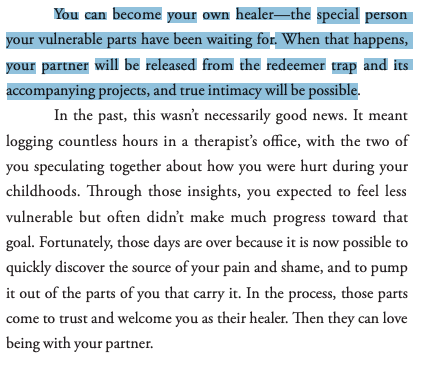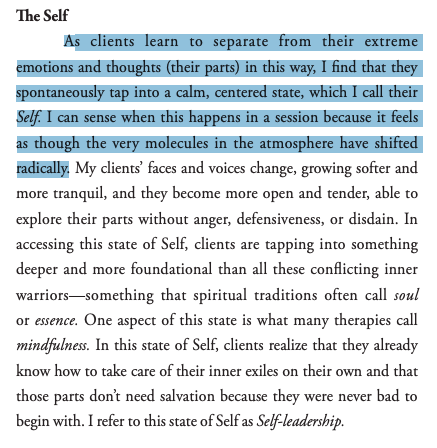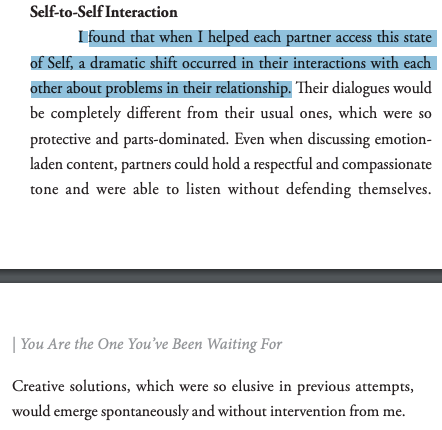this valentine's day please give yourself the gift of this free sample of richard schwartz's IFS relationship book, "you are the one you've been waiting for"
thread of choice quotes (all of this is from the introduction and first chapter alone)
https://ifsca.ca/wp-content/uploads/You-Are-Th-eOne-Ch-1-book.pdf
thread of choice quotes (all of this is from the introduction and first chapter alone)
https://ifsca.ca/wp-content/uploads/You-Are-Th-eOne-Ch-1-book.pdf
"Each partner is asked what he or she needs from the other, and therapy is designed to find ways that each can change to meet the other’s needs. What if there is an essential flaw in this accommodation premise that sets up couples to fail?"
"When each partner has courageous love for the other... each partner is released from being primarily responsible for making the other feel good. Instead, each knows how to care for his or her own vulnerability, so neither has to force the other into a preconceived mold"
"Courageous love involves accepting all parts of the other
because there is no longer a need to keep the other in the confining roles of parent/redeemer/ego booster/protector."
because there is no longer a need to keep the other in the confining roles of parent/redeemer/ego booster/protector."
"For reasons that will be discussed at length in the pages
to come, your partner cannot succeed in making you feel good in a lasting way."
to come, your partner cannot succeed in making you feel good in a lasting way."
"When that love stops flowing, even momentarily, we
get scared and go to work on one of three projects. The first two of these are designed to get our partner back into that loving redeemer role. The third project is to give up on that endeavor and find alternatives."
get scared and go to work on one of three projects. The first two of these are designed to get our partner back into that loving redeemer role. The third project is to give up on that endeavor and find alternatives."
"The first, and most common, project involves directly
trying to force our partner to change back.... We plead, criticize, demand, negotiate, seduce, withhold, and shame—all in an effort to get her to change. Most partners resist our crude attempts to perform open-heart surgery"
trying to force our partner to change back.... We plead, criticize, demand, negotiate, seduce, withhold, and shame—all in an effort to get her to change. Most partners resist our crude attempts to perform open-heart surgery"
"The second project is to... use self-criticism and shame to cut out parts of our personalities... hoping that if we please him, he will love us. Because this self-transformation project isn’t authentic—and instead is focused on manipulating our partner—it usually backfires, too"
"The final project kicks in once we give up.... At that point, we begin to close our heart to him and: (1) search for a different partner, (2) numb or distract from the pain and emptiness enough to stay with the original one, or (3) numb and distract enough to live alone."
"[I]t isn’t hard to discern some combination of these three projects behind [a couple's] dysfunctional patterns of interaction. This is because virtually all of us carry inner vaults full of pain, shame, and emptiness, and none of us know how to deal with these emotions..."
"I call these often-quarrelling subpersonalities parts because when I first started doing this kind of work, that is how my clients referred to them. “Part of me wants to stay married and faithful, but another part wants to be free to get laid...,” a client might say."
"The critical voice that harangued Debbie Ford with so much self-loathing is an example of one common type of part called a protector, which tried to keep her from taking risks by running down her confidence."
"The more vulnerable inner childlike part that believed her critic and, as a consequence, felt worthless and empty is an example of a type of part I call an exile."
"[I]f I could establish a safe, accepting atmosphere in our sessions, clients could have inner discussions with their parts. In a powerful state of internal focus, they could dialogue with their parts about what motivated them to react in such irrational or self-defeating ways."
"As they listened to their parts’ stories, what at first seemed irrational suddenly began to make sense as many parts let the clients know that they were stuck at points in the past when the behaviors or beliefs were understandable and even necessary."
"You can become your own healer—the special person your vulnerable parts have been waiting for. When that happens, your partner will be released from the redeemer trap and its accompanying projects, and true intimacy will be possible."
"As clients learn to separate from their extreme emotions and thoughts (their parts) in this way, I find that they spontaneously tap into a calm, centered state, which I call their Self. ... My clients’ faces and voices change, growing softer and more tranquil"
"I found that when I helped each partner access this state of Self, a dramatic shift occurred in their interactions with each other about problems in their relationship.... partners could hold a respectful and compassionate tone and were able to listen without defending"
"Creative solutions, which were so elusive in previous attempts, would emerge spontaneously and without intervention from me."
new thread for chapter 1 https://twitter.com/QiaochuYuan/status/1361090957727330305?s=20

 Read on Twitter
Read on Twitter
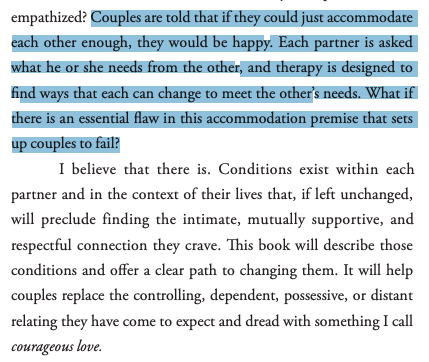
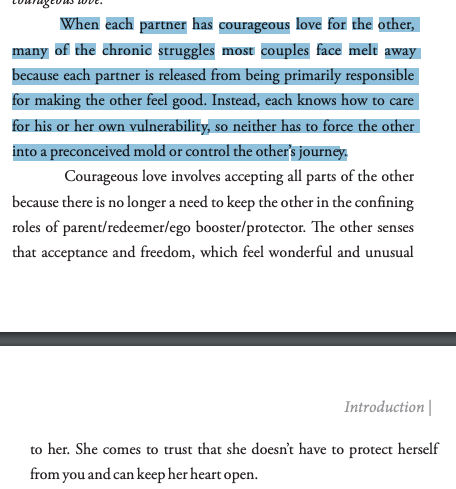
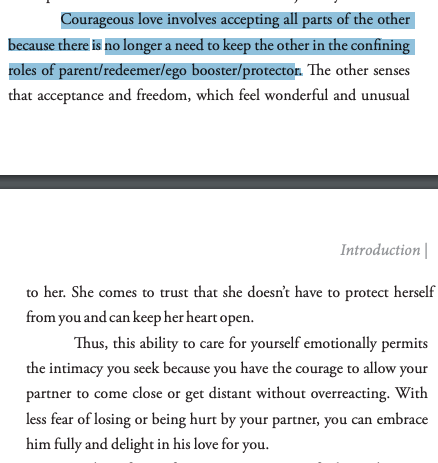
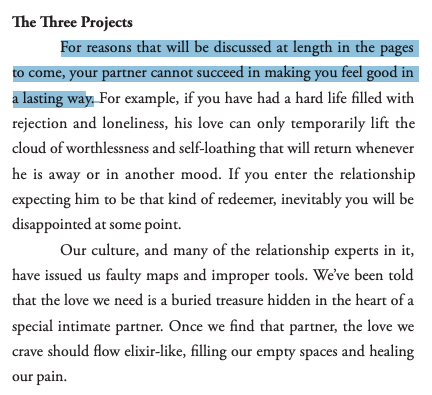
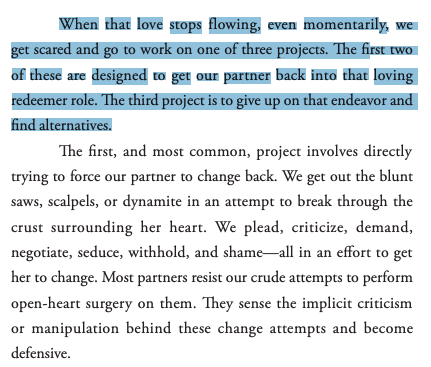


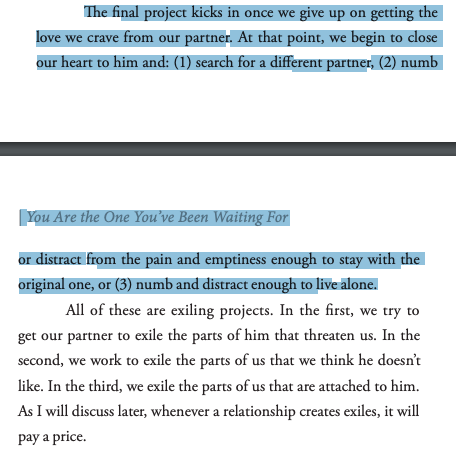
!["[I]t isn’t hard to discern some combination of these three projects behind [a couple's] dysfunctional patterns of interaction. This is because virtually all of us carry inner vaults full of pain, shame, and emptiness, and none of us know how to deal with these emotions..." "[I]t isn’t hard to discern some combination of these three projects behind [a couple's] dysfunctional patterns of interaction. This is because virtually all of us carry inner vaults full of pain, shame, and emptiness, and none of us know how to deal with these emotions..."](https://pbs.twimg.com/media/EuOLHRLVkAAwYR2.png)
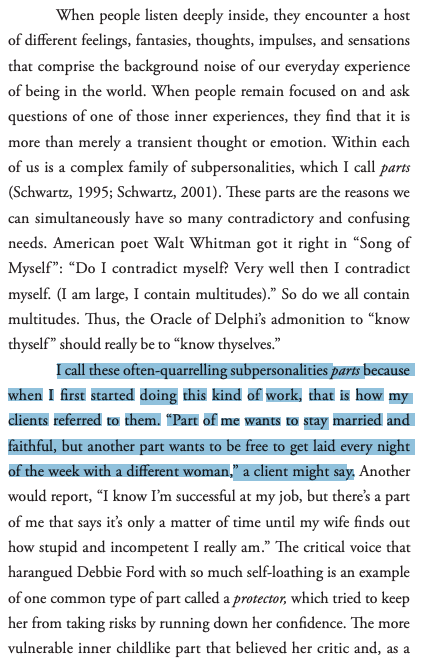
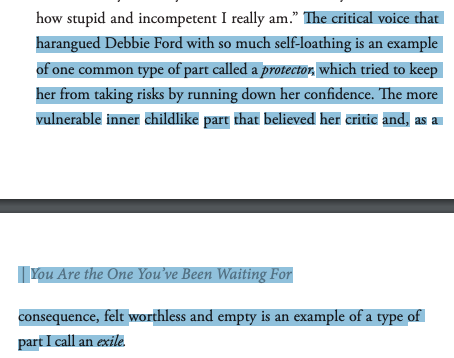
!["[I]f I could establish a safe, accepting atmosphere in our sessions, clients could have inner discussions with their parts. In a powerful state of internal focus, they could dialogue with their parts about what motivated them to react in such irrational or self-defeating ways." "[I]f I could establish a safe, accepting atmosphere in our sessions, clients could have inner discussions with their parts. In a powerful state of internal focus, they could dialogue with their parts about what motivated them to react in such irrational or self-defeating ways."](https://pbs.twimg.com/media/EuOPEqMUcAIP0-E.png)
